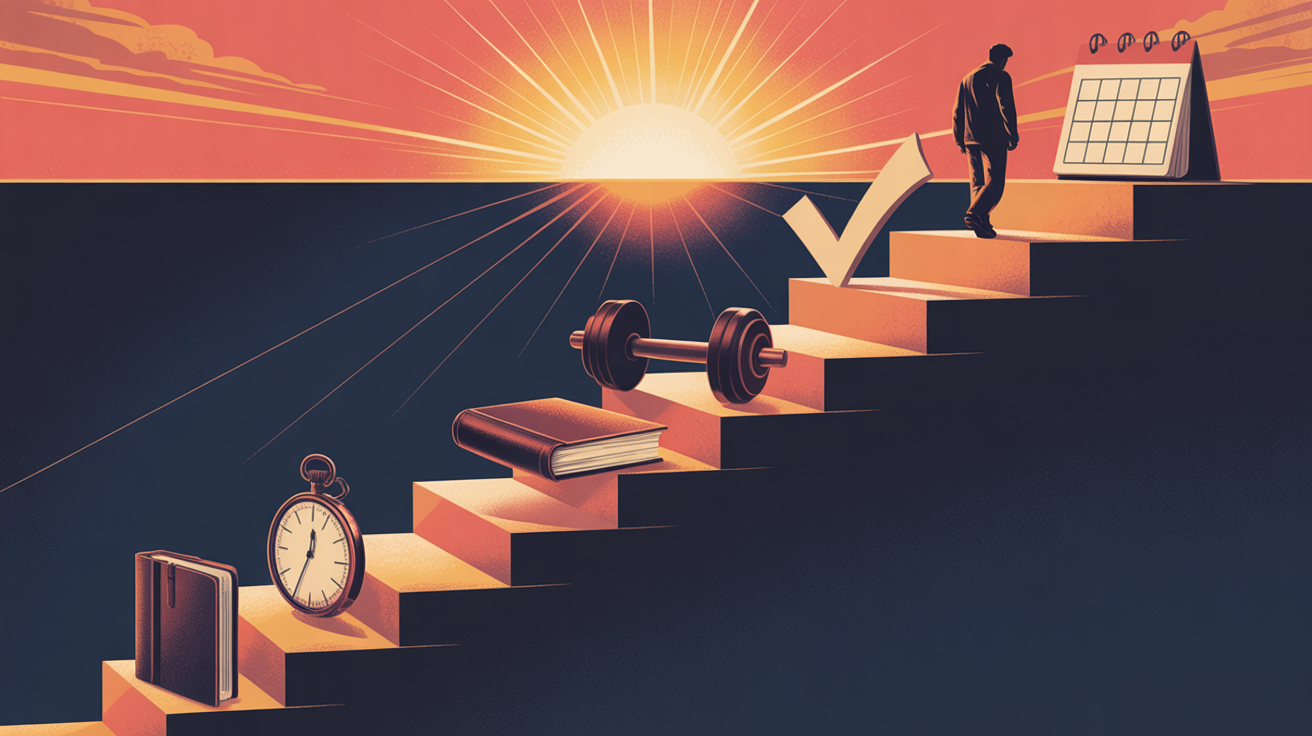
How Self-Awareness Leads to Better Decisions (Stop Self-Sabotage)
Ever made a choice that felt logical in the moment, only to realize weeks later it sabotaged your peace, relationships, or progress? Maybe you overcommitted (hello, burnout!), swallowed your truth (people-pleasing strikes again), or self-rejected before even trying (“I’m not ready yet“). 🤯 If this sounds achingly familiar, you’re not alone. Driven, intelligent people—likely like you—often get trapped in cycles of self-undermining despite knowing better intellectually. The culprit isn’t laziness or low IQ—it’s a critical gap in self-awareness.
You crave clarity. You want to trust that quiet inner voice over the noise of fear, “shoulds,” or past conditioning. You’re exhausted by emotional whiplash and autopilot reactions. Here’s the transformative truth: Cultivating deep self-awareness is your master key 🔑 to confident choices and dismantling self-sabotage for good. This isn’t theory—it’s neuroscience-backed strategy. In this guide, you’ll discover:
- How self-awareness rewires your brain’s decision-making circuits 🧠
- How to decode your triggers and core values (your internal GPS) 🗺️❤️
- Practical tools to pause impulses and choose intention 🛠️
- Why self-trust becomes unshakeable when awareness deepens 💪
Ready to stop second-guessing and start choosing aligned success? Let’s dive in.
Table of Contents
- The Self-Sabotage Trap: Why Smart People Make Regretful Choices 😵💫
- Self-Awareness Defined: Beyond Surface-Level “Know-Yourself” Quotes 🔍
- Your Brain on Autopilot vs. Awareness: The Neuroscience Shift 🧠➡️💡
- Trigger Decoder: Mapping Your Emotional Landmines 🗺️💥
- Values as Your GPS: Making Choices That Actually Fit ❤️🧭
- The Aware Decision Toolkit: From Impulse to Intention 🛠️
- The Self-Trust Breakthrough: Your Reward for Deep Work 💪✨
- Start Today: 5 Simple Practices (Zero Overwhelm!) 🌱
1. The Self-Sabotage Trap: Why Smart People Make Regretful Choices 😵💫
You’re competent. You achieve goals. Yet that critical voice whispers: “What if you fail? They’ll judge you. Just play safe.” Self-sabotage isn’t weakness—it’s a protection mechanism gone rogue.
- Classic Sabotage Tactics:
- Perfectionism (disguised fear of failure)
- Overgiving (ignoring your needs to “earn” love)
- Procrastination (“I’ll start when I’m 100% ready”)
- Impulsive escapes (scrolling, overworking, emotional outbursts)
- The Hidden Engine: Unconscious beliefs like:
- “I’m not worthy of success.”
- “My needs burden others.”
- “It’s safer to stay small.”
- The Cost: Eroded self-trust, chronic anxiety, stuckness, and living a life that feels like someone else’s script.
“We cannot solve problems with the same thinking that created them.” — Albert Einstein
Common Mistake: Fighting the behavior (e.g., forcing yourself to “say no”) without healing the belief driving it (e.g., “If I say no, I’ll be abandoned”).
🛠️ Actionable Takeaway:
Identify one recent self-sabotaging choice. Ask:
- What was the behavior? (e.g., Avoided applying for a dream job)
- What fear whispered beneath it? (e.g., “I’ll be exposed as incompetent”)
2. Self-Awareness Defined: Beyond Surface-Level “Know-Yourself” Quotes 🔍
True self-awareness isn’t “I’m an introvert” or “I love yoga.” It’s a dynamic, 3-layer skill:
| Layer | What It Reveals | Tool to Access It |
| Internal Awareness | Your emotions, triggers, core values, needs, limiting beliefs. | Shadow work prompts, journaling (“When did I feel most/least like myself today?”) |
| External Awareness | How others perceive you + your impact on them. | Feedback requests (“How did my delivery land in that meeting?”) |
| Somatic Awareness | Your body’s wisdom (gut feelings, tension, energy shifts). | Body scans, breathwork 🧘♀️ |
Why Depth Matters:
Knowing “I get anxious before presentations” is surface-level. Deep awareness sounds like: “My throat tightens when speaking up—it traces back to Mr. Smith mocking me in 8th grade. My body fears humiliation.” This specificity is where healing begins.
3. Your Brain on Autopilot vs. Awareness: The Neuroscience Shift 🧠➡️💡
Decision-making isn’t ruled by logic alone. Two brain regions battle for control:
- Amygdala: Your alarm system. Triggers fight/flight/freeze/fawn reactions during stress.
- Prefrontal Cortex (PFC): Your wise CEO. Manages rational thought, consequences, values.
Self-awareness creates a PAUSE ⏸️ between trigger and reaction, letting your PFC override amygdala hijacks. Neuroscience proves this:
- Mindfulness strengthens PFC neural pathways (Davidson, 2003).
- Interoception (feeling bodily sensations) predicts emotional regulation skills (Critchley, 2004).
⚡ Pro Tip: The 60-Second Body Scan
Before any decision, pause. Close your eyes. Scan head-to-toe:
- Where is tension? Butterflies? Heaviness?
- Your body’s signals (calm? dread?) reveal subconscious truths logic misses.
Expert Insight: Dr. Dan Siegel’s “Mindsight” (linking here) describes how observing your inner world integrates brain function for wiser choices.
4. Trigger Decoder: Mapping Your Emotional Landmines 🗺️💥
Triggers = Goldmines for self-awareness. They’re disproportionate reactions pointing to unhealed wounds.
🔍 Decode Your Triggers in 4 Steps:
- Spot the Pattern: What situations make you rage/shut down? (e.g., criticism, being ignored, authority figures).
- Name the Emotion: Is it anger—or shame masking as anger? Use a feelings wheel for precision.
- Trace the Root: When did you first feel this? (e.g., “Being interrupted triggers me because my alcoholic parent never listened”).
- Regulate Your Nervous System:
- Box Breathing: Inhale 4s → Hold 4s → Exhale 4s → Hold 4s. 📦
- Grounding: “Name 3 blue objects in this room. Feel your feet on the floor.”
Real Example: Maya exploded when her partner asked, “Did you call the bank?” Mapping revealed it mirrored her critical father’s tone. Healing that wound helped her respond calmly: “That tone stresses me. Can you ask differently?”
⚠️ Mistake to Avoid: Blaming others (“He MADE me angry!”) instead of owning: “This activated my wound around disrespect.”
5. Values as Your GPS: Making Choices That Actually Fit ❤️🧭
Your core values are non-negotiable anchors. Decisions aligned with them create integrity. Ignoring them breeds self-sabotage.
📍 Find Your Top 3 Values:
- Peak Moments Method: Recall 3 times you felt proud/alive. What values were present? (e.g., Creating that project → Creativity; Helping your team → Contribution).
- Anger as a Compass: What violations make you furious? (e.g., Lateness → Respect; Gossip → Integrity).
🧭 Align Decisions Using Values:
Facing a choice? Ask:
- Does this honor my core value of [Authenticity/Growth/Freedom]?
- Which option feels expansive vs. contracting in my body?
“Values are like fingerprints. Nobody’s are the same, but you leave ’em all over everything you do.” — Elvis Presley
🛠️ Resource: Download Brené Brown’s Dare to Lead Values List (linking here) and narrow to your non-negotiables.
6. The Aware Decision Toolkit: From Impulse to Intention 🛠️
Use these science-backed tools when choices feel murky:
The P.A.U.S.E. Protocol ™️
| Step | Action | Example |
| Pause | Stop. Breathe. Create space. | Put phone down. Walk outside. |
| Acknowledge | Name emotions/thoughts. Scan body. | “I feel panicked. My chest is tight.” |
| Uncover | Identify trigger → wound → core need. Check values. | “This deadline triggers my fear of failure. I need support.” |
| Strategize | Brainstorm aligned options. Ask: “What would my Future Self do?” | “Delegate Task B. Ask for extension.” |
| Engage | Act with intention. | Send the email. Set the boundary. |
Advanced Tools:
- Byron Katie’s “The Work” (linking here): Question stressful thoughts (“Is it true? Can I absolutely know?”).
- Future Self Journaling: “What will Past Me thank Present Me for choosing today?”
7. The Self-Trust Breakthrough: Your Reward for Deep Work 💪✨
Every conscious choice builds self-trust. How it compounds:
| Awareness Action | Self-Trust Deposit |
| Honoring a boundary | “I keep promises to myself.” |
| Choosing values over fear | “I prioritize my integrity.” |
| Regulating a trigger | “I handle my emotions wisely.” |
Why Self-Sabotage Fades:
When you trust yourself to handle discomfort, you no longer need “protection” tactics like procrastination or people-pleasing.
🔬 Science-Backed: Self-Determination Theory (linking here) proves autonomy (feeling in charge of choices) is a core human need—fueled by self-trust.
⚡ Pro Tip: Decision Autopsies
After a tough choice, review without judgment:
- What did my awareness reveal BEFORE deciding?
- What would I tweak next time?
(This builds wisdom, not shame.)
8. Start Today: 5 Simple Practices (Zero Overwhelm!) 🌱
Choose ONE to practice this week:
- 🌅 Morning Body Check-In (2 mins):
Scan head-to-toe: “Where’s tension? Energy? What do I NEED today?” - 📝 Values Check Before Saying “Yes”:
Glance at your Top 3 Values. Ask: “Does this align?” - 🗯️ Trigger Tracker (Notes App):
Jot: “Trigger: [Event] → Emotion: [Feeling].” - 🧠 P.A.U.S.E. on ONE Decision:
Use it for minor choices (e.g., replying to an email). - 💌 Evening Journal Prompt:
“Today, I honored myself by ______. It felt ______.”
Conclusion: Your Path to Unshakeable Clarity
Self-sabotage crumbles when self-awareness illuminates your triggers, values, and needs. Each time you P.A.U.S.E., scan your body, or choose alignment over fear, you rewire your brain for decisions that build confidence—not regret. The result? A life where choices flow from self-trust, not old wounds. No more autopilot. No more second-guessing. Just you, fully awake at the wheel.
🚀 Your Call to Action:
Grab your journal and answer:
“One decision I often overthink is ______. When I tune into my body and values around it, I sense ______.”
Share your insight below—we’re rooting for you! ✨
✨ Meta Description (159 chars):
Stop self-sabotage with self-awareness. Neuroscience-backed tools to decode triggers, align with values & make confident decisions. Start today.
🔗 Internal Linking Opportunities:
- [How to Start Shadow Work: A Beginner’s Guide]
- [10 Nervous System Regulation Hacks for Instant Calm]
- [Define Your Core Values: Brené Brown’s Step-by-Step Exercise]
📚 Authoritative External Sources:
- Dr. Dan Siegel’s Mindsight: The New Science of Personal Transformation
- Byron Katie’s The Work (www.thework.com)
- Self-Determination Theory (SDT) Overview on PositivePsychology.com






